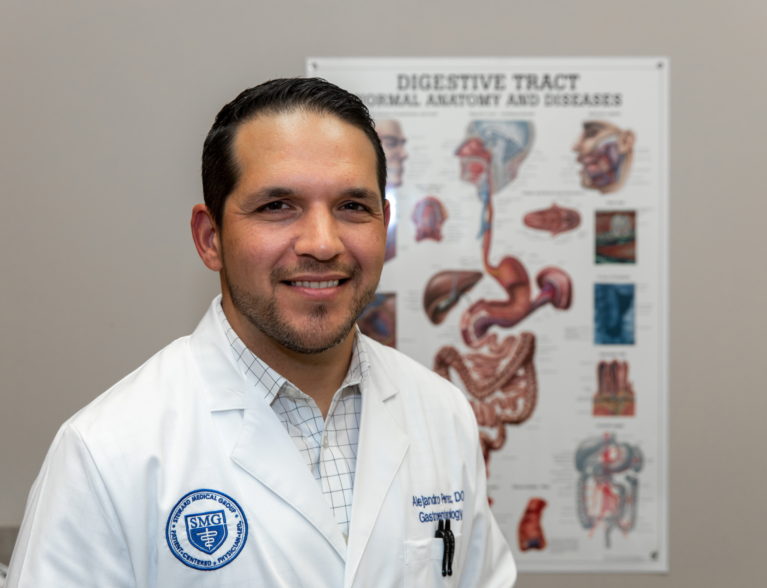
Proton pump inhibitors (PPIs) such as Prevacid, Prilosec and Nexium are among the most commonly used drugs in the world.
About 15 million people in the U.S. use PPIs, spending close to $18 billion a year purchasing them, according to an estimate by U.S. Pharmacist.
Proton-pump inhibitors are, according to the Harvard Medical School, “the strongest type of medicine available for treating stomach acid.”
First introduced in 1989 as a prescription-only medication, the Mayo Clinic says “PPIs are currently approved by the FDA for the management of a variety of gastrointestinal disorders including symptomatic peptic ulcer disease, gastro-esophageal reflux disease (GERD) and non-ulcerous dyspepsia, as well as for prevention of gastrointestinal bleeding in patients receiving anti-platelet therapy.”
Today at least two generic, over-the-counter versions are also available.
Nonetheless, sitting in his Vero Beach office, local gastroenterology specialist, Dr. Alejandro Perez, with Steward Health Care’s Sebastian River Medical Center, urges a modicum of caution and suggests having detailed conversations with your physician before starting on a course of PPIs, and regular follow-up discussions after that.
Why? And what, exactly, are PPIs?
In the simplest of terms, PPIs are drugs that target the proton pump or “parietal” cells, which are the acid-secreting cells located in the stomach wall. PPIs limit the amount of acid those pumps produce.
That’s a good thing, right?
Not necessarily.
According to the National Institutes of Health, when the pH of the stomach becomes less acidic, harmful microbes that would normally be destroyed in the acidic environment are able to pass unscathed into the small and large intestines where they can cause any number of more serious problems including “clostridium difficile,” a potentially life-threatening inflammation of the colon.
A number of studies and clinical trials have intimated – though not proven – that prolonged PPI use may lead to other serious problems. As the Mayo Clinic said in 2018, “recent studies regarding the long-term use of PPI medications have noted potential adverse effects, including risk of [bone] fractures, pneumonia, hypomagnesemia, vitamin B12 deficiency, chronic kidney disease and dementia.”
Perez says the largest and most recent study, published in May of this year in the journal Gastroenterology, says PPIs were “not associated with any adverse event when used for three years,” but he points out that many PPI users have been taking the drugs far longer than three years.
Another reason, besides potential side effects, to think twice before taking PPIs is that, according to Perez, “the data suggest 30 percent of people with acid reflux symptoms can get those symptoms under control with just some simple lifestyle and dietary changes,” instead of taking potent prescription or over-the-counter medicine.
“You’d be surprised,” says the approachable Perez, “I have that conversation probably once a day. People come in and say, ‘You know, every time I eat a slice of pizza I feel horrible.’
“I have to pause a second and say, ‘I’m sorry to break it to you, but you may just need to stay away from pizza.’”
For many people, simple changes like that can solve stomach acid problems without any medication at all.
Perez then adds that, “the more calories you consume in one meal, the more acid gets produced and the higher the likelihood” of having acid reflux problems.
If you are using PPIs and want to get off the medication, be prepared for a challenge.
“The tricky part nowadays is what do we do when [patients] try and come off of PPIs?” Perez says. “I’d say nine out of 10 people, when they try and cut it cold-turkey, they say ‘Sunday is my last dose’ but by Tuesday they’re calling me in office saying their chest is on fire and they can’t deal with it and they go back on the medication.
“That’s a conversation we need to have in the office,” Perez says. “There’s a couple of ways to try and taper off, maybe using other medications like h2 blockers for a period of time. There are also some natural things we can try to incorporate and sort of slowly come off the PPI medications.”
“I would just say again, having a discussion with your doctor on why you’re taking them, how long have you’ve been taking them and is there truly an indication to be taking them” is really important.
“Generally we’re seeing from the data that [PPIs] are still very safe, but no medication has zero side effects, so you do have to have these discussions.”
Dr. Alejandro Perez is with Steward Health Care’s Sebastian River Medical Center. He has offices at 3745 11th Circle, Suite 103 in Vero Beach and at 8005 Bay Street, Suite One in Sebastian. The phone number is 772-567-4825.



